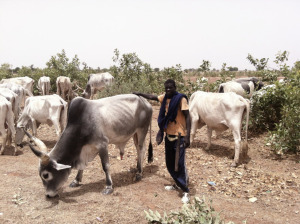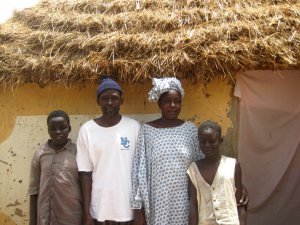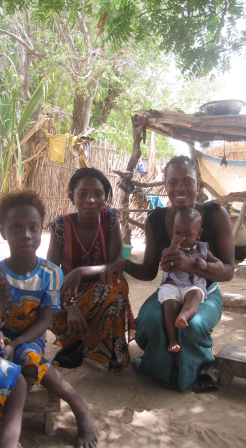My 40th Birthday in Senegal
Today was my 40th birthday. I remember my Mum and Dad heading out to dinner to celebrate Mum’s 40th, when I was just 11. They seemed so old! I don’t feel old at all, and funnily enough, I no longer think they are either. Today I shared my birthday with an elderly Village Chief in a remote village in Senegal, a village that his father established in 1957. He reminisced with me about the good old days. And, I met some confident Senegalese children who had a different tale to tell! This is indeed a suitable 40th birthday story…
 A Village Struggling
A Village Struggling
Senegal is doing it hard at the moment, after a few successive years of poor rains. The Village Chief told me it is the worst situation his village has ever seen. You can see the ribs sticking out in every donkey and cow. Yesterday one of his cattle died. The day before, one of his friend’s. Every day, someone loses one. The village has a well, but the water is 50 metres under the ground, and it takes a long time to get enough simply to survive. The ladies at the well happily joked that I must have come to draw the water for them. Perhaps I could have managed a bucket, but there were 40 large water containers sitting waiting to be filled…
It’s hot. Very hot. 41 degrees and 60% humidity. Last night the electricity went off in the small town I was in, and the backup generator was broken. I spent the night sweltering in a room which couldn’t have dropped below 30, sweat pouring off me trying to cool me down, but to no avail without a fan to create a breeze. In a nod to our common humanity, my Senegalese friends hardly slept a wink either. During the day, it’s hard to do a lot except seek the shade.
The Village Chief didn’t have electricity in the first place, but at least he could sleep outside and catch a natural breeze. ‘The young men have all left’ he said, to try and find work in the city. ‘Not so long ago there were beautiful mango trees all around the village, but ten years ago ‘ants’ came and destroyed them all, now there is no fruit to eat’. It pains him that so many families have left the village, because ‘I have been unable to supply them with water’. And he remembers the days of his youth, when food was plentiful, and his father would wander around with ‘meat and rice in his pockets’ able to distribute it to anyone in need.
A Most Courageous Father
He introduced me to his friend Mody, whose father had helped to establish the village. Mody’s two children, Cheikh and Fatou were blind at birth. His 3rd child died in his wife’s womb, and remained there for four days. His last child died in childbirth, and his wife came very close as well.
 Mody sold his cow and horse to get the cash needed to save her life, and the family have never recovered since. No school would accept Cheikh and Fatou. Mboyo also has diabetes, and has horrible scarring around her ankle where a doctor operated to save her foot. She also is unable to carry the water, and so relies on friends or Mody.
Mody sold his cow and horse to get the cash needed to save her life, and the family have never recovered since. No school would accept Cheikh and Fatou. Mboyo also has diabetes, and has horrible scarring around her ankle where a doctor operated to save her foot. She also is unable to carry the water, and so relies on friends or Mody.
Fatou cannot help in the fields, but every time that his father says ‘Fatou is unable to help’, Fatou’s small voice would pipe up saying that he WAS able to help, shelling the peanuts, or carrying the water from the yard to the house. I’m amazed at his confidence in speaking up for himself, and I’m so, so sad that there is no support for such a brave child, and a brave family living in harsh conditions.
As I make to leave, Mody wants to impress upon me his most important feelings; ‘I am 57’ he said. ‘My only preoccupation is about what will happen to my children when I am gone’. It is hard to encourage him with any hope as I leave.
8 Miles Away, but a World Apart
 But courage, they say, is the ability to stick your arm into the darkness and pull out a handful of light. World Vision is about to start working in this area, and my next meeting provides me with that glimmer of light.
But courage, they say, is the ability to stick your arm into the darkness and pull out a handful of light. World Vision is about to start working in this area, and my next meeting provides me with that glimmer of light.
Eight miles away, I meet 16 year old Khady. Three years ago, mains water was supplied to Khady’s village. It is sheer pleasure to see Khady’s family and friends go to the tap and drink freely while we chat. It is still around 40 degrees in the shade!
Khady’s mother gave up school when her father refused to buy her a pair of shoes. Not so Khady, who is doing well in High School. Very well. She proudly retrieves half a dozen bits of school work from inside her hut, with marks between 70% and 100%, including a certificate of achievement of which she is very excited. Khady modestly attributes her success to the electricity that was connected to their yard a little while ago. It is only on from 7pm to 1am, but that is the time Khady needs to do her homework. She beams as she tells me that since the electricity was supplied, she has become top in her class. She still has many challenges to face. Her father has left, and her mother struggles to provide enough food. This season, with the poor rains, she says that she coped by having rice for breakfast and rice for dinner. Lunch wasn’t mentioned.
But Khady has hope for the future. In her case, it’s a little different. Most aspiring girls here want to be teachers and nurses. Khady wants to be a soldier! I ask if that is possible, and it appears that a few years ago Senegal opened its military to females. In other countries in the region, this would not be something to encourage! But Senegal is peaceful and stable, and for an intelligent young lady to aspire to be a soldier shows a wonderful confidence to step outside stereotypes and forge her own future. When I ask her mother how she feels about that, her mother smiles and says ‘It’s her education, and so if that’s what she wants to do, I am very happy for her!’ Just amazing.
The Distance Between Hope and Desperation
Eight miles – the distance between Cheikh and Khady. The distance between genuine hope for the future, and clinging onto hope for life. The distance between those with education, water & technology, and those without. People often think that nothing ever improves here. They are so wrong. The challenges we face today are very different to those 40 years ago when I was born, not least due to the impact of climate change. But vast inroads have been made, thanks to the expansion of things like education, water and technology. Today, it feels like those inroads are just eight miles too short.
But that story will change soon too as World Vision gets ready to begin work in Cheikh’s village. If you’ve got any questions for me about my visit to these villages or about what life is like in Senegal then please post them below, I’d love to answer them. Or if you’d like to help give another child like Khady a better future you could sponsor a child in West Africa
Written on June 15 by Andrew Stott, World Vision UK’s Head of Supporter Experience.